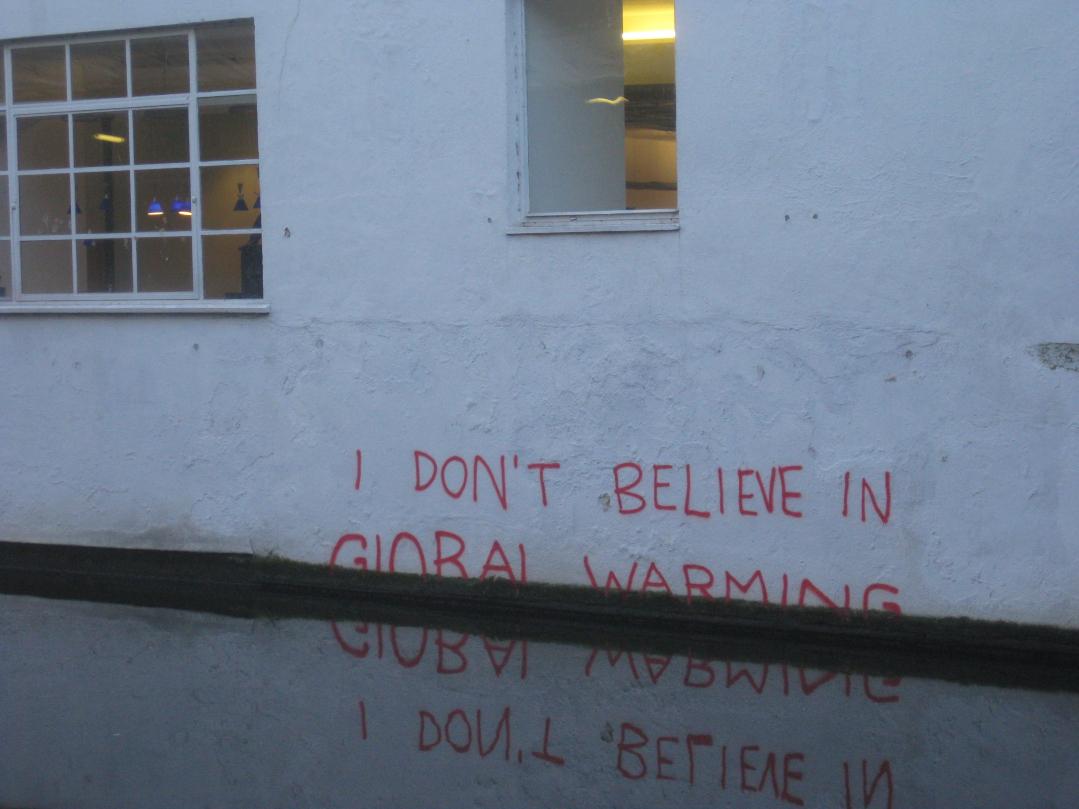This is one approach to misconception-based teaching—and in fact the one we’ve used with our Teacher Ambassadors as they’ve constructed evolution and climate change lesson plans—and it is particularly effective because it not only confronts the misconception with correct information but also provides a mechanism for comprehension.
Common misconceptions concerning climate change and evolution are not misunderstandings or gaps in understanding, like a child thinking their ice cream would fall from the cone if they were standing at the South Pole due to gravity, but rather the result of deliberate propaganda campaigns. These efforts are successful because they appeal to both emotional triggers and cognitive biases. To replace these misconceptions we must help students recognize the fallacy as well as involve them in hands-on experiences with evidence that allow them to construct their own understanding of the accurate explanations for phenomena.
Misconceptions Rooted in Identity
Climate change and evolution misconceptions are often the result of misinformation aligned with an appeal to ideological or religious affiliations. This makes the misconception deeply rooted in identity and thus much harder to unseat. This is particularly challenging for a science teacher because it draws them into debates between the science content they are trying to focus on and the conflicts stoked by misinformation. Teachers are not prepared for this dynamic.
For one thing, science does not proceed by debate but rather by close examination of data and the accumulation of evidence for explanation. There is no debate about the data. Teachers are not often well prepared, however, to tease out the intricate details of the scientific process in the heat of a classroom conflict. They also usually lack the deft communication skills needed to disentangle propaganda and focus on evidence when under attack.
Both climate change and evolution are also rife with cognitive challenges, which to be honest are the result of evolutionary psychology. We evolved to notice details of faces and subtle changes in our immediate environments. We did not evolve to notice larger changes or changing frequencies of events across long stretches of time. We evolved to use language as a social tool, often associated with mythologies to produce social cohesion and encourage cooperative social behaviors. Our minds remain especially susceptible to misinformation and logical fallacy. It’s just how we’re built.
We also know that to change anyone’s mind about an issue tied up in their identity requires more than just giving them the correct information. It requires a no-conflict approach often focused on, or at least starting with, solutions to actual problems and issues. This can be done through evidence-based, and to whatever extent possible place-based, lessons. These lessons are effective because students construct understanding based on their own experience.
Evidence-Based Approach
These experiences are not just learning experiences but societal, tied together by the context of the student’s place and identity. The best way to guide students to new understanding is to engage them with evidence directly through hands-on experiences. This is what I mean by evidence-based teaching, and in this sense “evidence-based” has a double meaning. Students focus on evidence to form the understanding of a concept and the explanation of a phenomena, and teaching this way has been shown by decades of research to be the best way to teach science. The evidence from all of the research into how people learn supports this kind of inquiry-based approach.
In this approach, students’ experiences are focused on exploration of data, so they are concrete and real-world. By engaging students in discovery of real data, misconception can be exposed. Students can grapple with their new knowledge gained from their own experience and the misinformation presented to them outside of their prior experience.
Rejection of the misinformation is not always immediate due to the stubborn nature of identity formation, but cracks in the edifice of misconception can grow and eventually lead to a realignment of a student’s understanding. This evidence-based approach is also non-confrontational and acknowledges the student’s intelligence and common sense. And another benefit to this approach is that students become inoculated—in other words, they’ve gained cognitive tools that are applicable in other contexts—against misinformation in general, not just the specific misconception they identify in the lesson.
Our approach helps overcome both cognitive bias and misconceptions aligned to ideology by identifying the misconception directly, engaging students in explorations of evidence that betrays the misconception, and then applying the evidence to real problems. Students are inoculated against future misinformation because they have learned not only the correct content, but also how we know that the evidence is correct. The first-hand experience of scientific problem solving allows students to trust their new knowledge.
So now you can enjoy your ice cream, even at the South Pole.
If you’d like to see how misconceptions-based teaching has been realized by our Teacher Ambassadors, check out our Turning Misinformation Into Educational Opportunities lesson plans and webinars.


